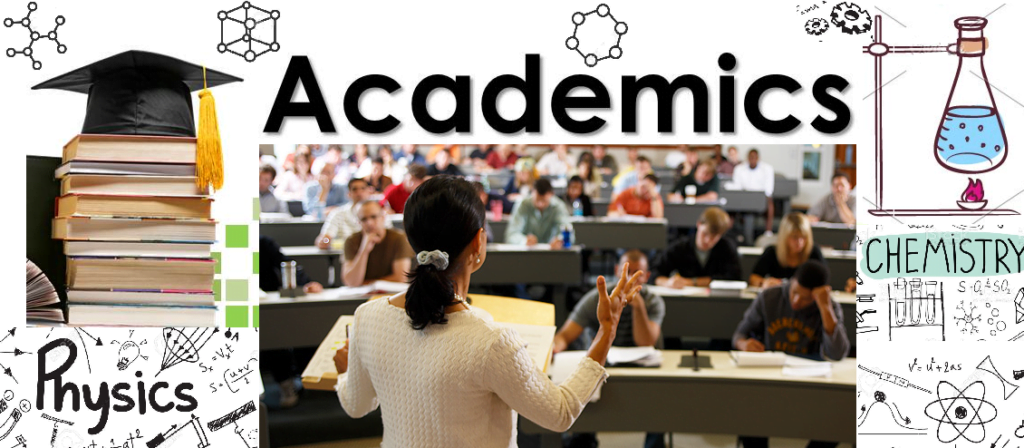Academics
Hello, readers! Here you can learn various subjects and topics for academic classes from class 1 to class 12.
Table of Contents

Academics Curriculum for –
Class 9th CBSE
Class 10th CBSE
Class 11th CBSE
- Class 11th Subject PHYSICS
- Class 11th Subject CHEMISTRY
Class 12th CBSE
- Class 12th Subject PHYSICS
- Class 12th Subject CHEMISTRY
👉🖱️ Basic Shiksha Parishad
| Mathematics (गणित) कक्षा – 5 | Mathematics (गणित) कक्षा – 4 |
| ‘प्रकृति’ पर्यावरण (EVS) कक्षा – 5 | |
| हिंदी कक्षा – 5 |
प्रारंभिक भाषा प्राथमिक कक्षा
Academics, often referred to as formal education or schooling, is a system of learning and acquiring knowledge in various fields of study. It typically takes place in educational institutions such as schools, colleges, and universities. Academic pursuits involve a structured curriculum, assessments, and the pursuit of degrees or certifications.
Academics play a significant role in society as they provide individuals with the knowledge, skills, and qualifications needed for personal growth, career advancement, and contributions to the community. Here are some key aspects related to academics:
- Subjects and Disciplines: Academics encompass a wide range of subjects and disciplines, including mathematics, science, social sciences, humanities, arts, languages, business, engineering, and more. Each discipline has its own unique body of knowledge, methodologies, and areas of study.
- Curriculum: The curriculum refers to the set of courses and learning experiences offered within an academic program. It outlines the knowledge, skills, and competencies that students are expected to acquire during their studies. The curriculum is often structured, with courses progressing from foundational to more advanced levels.
- Teaching and Learning: Academic institutions employ various teaching methods and strategies to facilitate learning. These may include lectures, discussions, laboratory work, group projects, research assignments, and practical experiences. Teachers or professors play a crucial role in guiding and facilitating the learning process.
- Assessments and Evaluations: Assessments are used to evaluate students’ understanding and mastery of the subject matter. These assessments can take the form of exams, quizzes, essays, presentations, projects, and practical demonstrations. Grades and feedback are provided to measure and communicate students’ performance and progress.
- Degrees and Certifications: Academic programs often lead to the attainment of degrees or certifications. These credentials signify the successful completion of a specific course of study or program requirements. Common degrees include bachelor’s, master’s, and doctoral degrees, while certifications validate expertise in specific fields.
- Research and Scholarship: Academics also involve research and scholarship. Students and faculty engage in research activities to expand knowledge, explore new ideas, and contribute to their respective fields. Research findings are often published in academic journals and shared within the scholarly community.
- Academic Support Services: Educational institutions offer various support services to aid students in their academic journey. These may include libraries, writing centers, tutoring programs, academic advising, career counseling, and academic resource centers. These services are designed to enhance students’ learning experience and provide them with the necessary tools for success.
- Lifelong Learning: Academics promote a lifelong learning mindset, encouraging individuals to continue acquiring knowledge and skills beyond formal education. This may involve professional development courses, continuing education programs, online learning platforms, and self-directed learning.
Overall, academics serve as a structured framework for individuals to gain knowledge, develop critical thinking skills, and prepare for their chosen careers. It provides a foundation for personal growth, intellectual exploration, and the pursuit of lifelong learning.